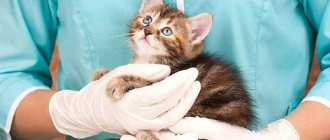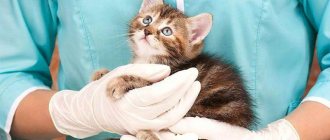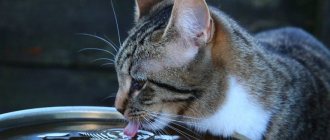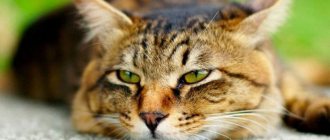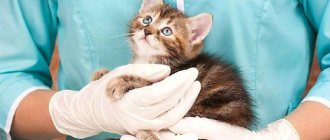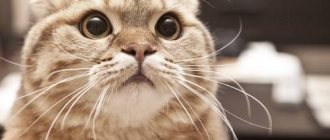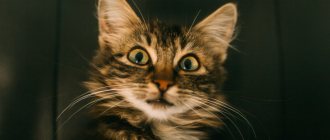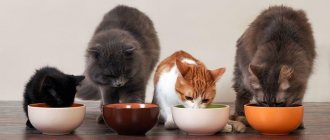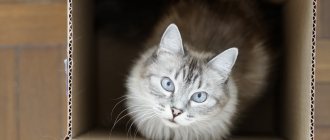Today, almost every person has pets. The most graceful of them are cats and female cats. Taking care of your pets from a very early age, you may encounter some problems.
When the baby is active, eats well, and has a healthy appearance, the owner should not worry. But not all owners know what to do if a small kitten does not eat well, looks exhausted and lethargic.
How does the condition manifest?
In cats, periods of increased activity are usually followed by apathy and drowsiness. It is difficult for owners to understand why and at what exact moments this happens. Therefore, a situation where a cat is lethargic, hardly eats and sleeps a lot, is alarming.
The owner should clearly know that poor appetite and less active behavior do not always indicate an animal illness. And the veterinarian is sometimes unable to understand why the cat is lethargic. The observations of an attentive and loving owner are extremely important here.
The main signs of cat health, in addition to good appetite and good spirits, are:
- shiny and smooth coat;
- pink and slightly moistened mucous membranes;
- cold and slightly damp nose (normally, during sleep it can become warm and dry);
- pulse, respiratory rate and temperature are within normal limits;
- absence of excessive discharge from the eyes, ears and nose, plaque in the mouth, salivation and unpleasant odor from the mouth and ears.
It is important! The normal duration of rest for a cat per day is 12-14 hours or more.
Possible causes of lethargy in healthy animals
Often there are reasons why a cat is lethargic, sleeps all the time and eats little, but it is better to understand each of them in order.
Stress
It is not uncommon for a cat to eat poorly and sleep a lot after a serious nervous shock.
Cats are very sensitive animals, so they have many causes of stress:
- travel by car;
- the arrival of a new family member or pet in the house;
- change of owner;
- repair or rearrangement of the house;
- visit to the veterinarian;
- change of place of residence by owners;
- lack of attention from the owner;
- pain;
- recent surgery;
- visit of guests;
- bathing and other hygiene procedures;
- changes in daily routine;
- the appearance of new and unusual objects in the house;
- first time on the street.
Usually cats cope with this situation quite well without medical help, but they really need the support of their beloved owner. However, in some particularly susceptible cats, stress lasts for quite a long time and can even be harmful to health.
The main physiological signs of nervous shock in a cat:
- urinary incontinence;
- rapid breathing;
- diarrhea or constipation;
- increased cleanliness (a cat can lick itself until bald spots appear on its fur and irritation on the skin);
- yawning too often;
- urinating in inappropriate places (the cat is marking its territory).
It is important! If, as a result of stress, the cat’s behavior does not return to normal for a long time, it is better to show the animal to a doctor. After all, nervous shocks can negatively affect his health and lead to the development of diabetes, skin diseases and disturbances in the functioning of the cardiovascular, digestive and genitourinary systems.
Change of feed
Often the cause of a lethargic state and refusal to eat is a change in diet (for example, switching from natural food to ready-made food and vice versa).
In this situation, you should return the cat to its previous food and treat it with some treat. Then the restoration of appetite and a cheerful state will occur very quickly.
Hot weather
Cats do not have sweat glands. They do not know how to cool themselves by opening their mouths, like dogs. Therefore, in the heat, to protect themselves from overheating, furry pets try to lie more in cool places. In addition, they begin to eat less so as not to waste energy on burning calories received with food.
Age
Over time, many owners begin to worry that their once active and nimble cat has become lethargic, eating almost nothing and lying around all the time. This is easy to explain: older cats no longer have as much energy for play; they sleep longer and more soundly than young animals.
If an elderly pet is lethargic, eats without appetite and sleeps a lot, but at the same time drinks water and has the above signs of a healthy cat, then there is no need to worry. However, an older cat should be regularly taken to the veterinarian for examinations to prevent the development of diseases.
Kittens spend almost 90% of the day sleeping until they reach two months of age. If the kitten is lethargic, plays little and eats poorly during periods of wakefulness, then the best solution is a trip to the veterinarian.
It is important! The maximum duration of healthy fasting for kittens is 1 day, for young cats and middle-aged pets – 3 days, and for “old people” – 2 days. If after this time the cat still does not start eating, you need to consult a doctor as soon as possible.
Pregnancy
In the early stages of pregnancy, many cats, like people, suffer from toxicosis. They become lethargic, try to move less and more carefully, sleep more and often refuse to feed.
If a cat was mated 3-4 weeks before this condition, then after another 5-6 weeks you can expect an addition to the cat family.
What to do if a small kitten cannot eat and drink on its own?
It happens that a little purr is separated from its mother cat too early. Experienced breeders of purebred animals give the kitten to new owners no earlier than 3 months of age, when it already knows how to eat on its own and is accustomed to a certain food. If the kitten was taken away from the cat when it was very tiny or the baby was simply found on the street, it is likely that he simply has not yet eaten anything other than his mother’s milk. The baby doesn't know how to lap from a bowl. Moreover, he has no habit of drinking water.
Such a cat will have to be fed milk from a pipette or bottle with a nipple. Moreover, it is recommended to use a special cat's milk substitute. Then you can gradually teach the kitten to lap from the bowl and eat wet food. A good way is to offer the baby food from your hand, sometimes this helps kittens start eating new food.
Possible pathological conditions
If the cat has been lethargic for several days, sleeps a lot, drinks and eats poorly, and can barely walk, the owner should under no circumstances let the situation take its course. Such a condition in the pet’s body most likely signals the development of a serious disease. The cat must be shown to a doctor in the next few hours.
Anemia
Anemia occurs when a cat's body produces less red blood cells and hemoglobin.
In addition to the fact that with anemia, a cat is lethargic and sad, it also exhibits other signs of this unpleasant disease:
- the nose becomes lighter;
- mucous membranes acquire a bluish tint;
- blood pressure decreases;
- the pulse is sometimes rapid, sometimes rare;
- breathing accelerates, shortness of breath appears;
- the fur becomes dull and may fall out;
- clear discharge appears from the nose.
Diseases of the cardiovascular system
If the cat eats poorly and constantly sleeps, is lethargic, tries to walk less - these may be signs of the development of a disease of the cardiovascular system.
Your pet may be bothered by fluctuations in blood pressure.
It is important! Normally, blood pressure in cats can “jump” from 105/65 to 135/95 mmHg.
With high blood pressure, furry couch potatoes experience:
- lethargy;
- decreased vision (while moving, the cat may bump into furniture and other objects);
- rapid pulse;
- dilated pupils;
- redness of the eyes;
- sometimes vomiting;
- in some cases - nosebleeds.
With low blood pressure, the pet refuses to eat due to nausea, sleeps a lot, its pulse slows down, and the cat may even lose consciousness.
In acute heart failure, the animal is also lethargic, its breathing becomes difficult, shortness of breath and bluish discharge from the nose appear.
An important symptom of the development of heart disease in a cat is its characteristic posture in a relaxed state. She usually stands with her front legs spread wide. This makes it easier for her to breathe.
Gastrointestinal diseases
Often the cause of a pet's lethargic and sleepy state and his refusal to eat are diseases of the gastrointestinal tract.
With gastrointestinal pathologies, a cat may exhibit symptoms:
- bloating;
- stools that are very dark, almost black, or mixed with blood and mucus;
- belching;
- constipation;
- flatulence.
Diseases of the urinary system
The development of urinary system diseases in cats, in addition to a lethargic state and lack of appetite, is accompanied by symptoms:
- too frequent or infrequent urination, or its complete absence;
- constant pain when urinating;
- the appearance of blood or pus in the urine;
- sweetish smell from the mouth;
- lower back pain;
- extremely unpleasant odor of urine.
To reduce pain at least a little, the animal lies down almost all the time, does not drink or eat.
It is important! If your pet has a blockage in the urethra, without medical attention he may die within 3 days.
Infectious diseases
In many cases, a cat’s lethargic behavior, refusal to feed and staying in almost constant sleep indicate an infectious disease.
Such diseases are extremely dangerous for cats and require immediate medical attention. The owner must remember that the life of his pet is literally counted in minutes.
The most dangerous infectious diseases that cause cats to become very lethargic are:
- Leptospirosis: Caused by the bacterium Leptospira. The disease affects almost all cat organs and is very dangerous for humans;
- Calcivirosis is a viral disease that affects the respiratory tract. It occurs mainly in cats under 2 years of age, but sometimes in older individuals;
- FIV is feline viral immunodeficiency: an extremely dangerous disease that affects the immune and nervous systems. Only representatives of the cat family, including wild representatives, can become infected with it;
- Panleukopenia (popularly called feline distemper) is a deadly disease that develops very quickly. It affects the cardiovascular, digestive and respiratory systems of the cat and is accompanied by intoxication of the entire body;
- herpes virus infection (another name is rhinotracheitis): caused by the feline herpes virus. Affects the respiratory and visual organs. If the animal is weakened by other diseases and does not receive proper treatment, the infection can lead to death.
The main signs of a cat becoming infected with a dangerous infection:
- lethargy and apathy;
- lack of appetite;
- high body temperature (above 40°C);
It is important! Normal body temperature in adult cats is 38-39°C, in small kittens – 38-39.6°C, in sphinxes – 38-41.5°C.
- labored breathing;
- cough and wheezing;
- vomit;
- foul, greenish diarrhea;
- bloody discharge from the mouth, nose, ears, eyes;
- soreness in some parts of the body.
Intoxication
Poisoning of the body (intoxication) in cats, in addition to lethargy and refusal to eat, is indicated by:
- diarrhea;
- vomit;
- increased salivation;
- increase or decrease in body temperature;
- redness or blueness of mucous membranes;
- constant feeling of thirst;
- convulsions and so on.
If you suspect poisoning, you should try to induce vomiting in the cat so that the body can at least partially get rid of toxins, and then take it to the veterinarian.
However, if more than 2.5 hours have passed since the poisoning, it is better to transport the pet to a veterinary hospital as soon as possible. After all, during this time, toxic substances have already spread throughout the circulatory system throughout the body.
In order to protect your furry pets from intoxication, you need to know its main causes:
- stale or poor quality food;
- contaminated drinking water;
- bites of snakes and poisonous insects;
- helminth infection;
- bacterial and viral infections;
- violation of hygiene rules when keeping animals;
- eating poisonous plants, fertilizers, chemicals;
- uncontrolled use of medications;
- individual intolerance to certain components of feed, hygiene products, etc.;
- exposure to toxic fumes from paint and varnish products.
Parasites
The cause of lethargic behavior and drowsiness can be a cat’s infection with external and internal parasites (fleas, ticks, worms).
Flea and tick bites cause itching and pain in cats. As a result, due to constant scratching, wounds appear on the skin, and the hair begins to fall out.
A cat with ear mites often shakes its head and scratches its ears, in which a lot of wax with an unpleasant odor can be found.
Cats infected with worms are often lethargic. Other signs of the disease:
- bowel disorder (diarrhea or constipation);
- vomit;
- itching and irritation in the anal area;
- temperature increase;
- bloating;
- the presence of eggs and particles of worms in the feces.
If external or internal parasites are detected in your pet, you need to begin exterminating them as soon as possible. The veterinarian will prescribe the medications.
The fight against parasites is very important, because they are quickly transmitted to both other animals and humans.
Other pathologies
In addition to the listed pathological conditions of cats, accompanied by lethargy, drowsiness and loss of appetite, the following painful conditions also occur:
- disturbances in the functioning of the endocrine system.
For example, after sterilization or childbirth due to hormonal imbalance, cats become lethargic and inactive.
Pets suffering from diabetes also do not want to move too much. In addition, such cats are constantly thirsty, eat a lot or very little, and often go to the toilet. They experience weight fluctuations, their vision deteriorates, their stomach enlarges, their muscles weaken;
- oncological diseases.
One of their symptoms in cats is a lethargic state. Changes in the pet’s well-being are clearly visible: the cat hardly eats, lies down all the time, vomits, and experiences internal bleeding. Such animals have very unpleasant breath, and upon visual examination, swelling and ulcers can be detected on the body;
- diseases of the musculoskeletal system.
Even an inexperienced owner can easily recognize them. With arthritis, dislocations, sprains, osteochondrosis, fractures and other problems, animals become lethargic, try to eat and move less. Cats' affected joints swell, they limp, rarely sharpen their claws and wash themselves. All movements cause them pain;
- complications after surgery.
Usually, in the first three days after the intervention, cats are very lethargic. This condition, in the presence of appetite and thirst, is considered normal.
But, if the animal’s temperature rises, blood or pus begins to ooze from the wound, vomiting or constipation often occurs - you need to contact the clinic as soon as possible. After all, these can be dangerous symptoms of suture dehiscence or suppuration, or the formation of a hernia.
Recommendations for feeding a kitten
In order for the kitten to eat food with pleasure, the owner needs to pay attention to some important points:
- food should not be cold; if food is stored in the refrigerator, then it should be slightly warmed before eating;
- exclude pork, lamb and other fatty foods from the diet due to their difficult digestion in the kitten’s gastrointestinal tract;
- take into account the characteristics of the pet’s breed and its preferences;
- Place food in a bowl in small portions, put the remaining food (food) in the refrigerator to prevent it from spoiling;
- supplement food with vitamin supplements according to age.
Attentive attitude towards the kitten on the part of the owner is the key to its comfortable keeping, timely vaccination and the use of proper, balanced nutrition.
It is very important that at the slightest disruption in the baby’s health there are no trifles. The sooner the owner responds to eliminating the pain, the faster the pet will recover and will delight the owner with its playfulness and spontaneity.
Interesting topics
What else to read:
- How to quickly train a kitten to go to the litter box Every owner wonders how to train a kitten to use the litter box, after all.
- Treatment of lichen in kittens at home Contents of the article Causes of the disease Which breeds are more susceptible Main symptoms Diagnosis in a veterinary clinic Treatment method.
- If a kitten has diarrhea Contents of the article Causes Associated symptoms Diagnosis in a veterinary clinic Treatment method and prognosis What to do at home Possible.
- Choosing a kitten for your home Contents of the article Which kitten should you give preference to The age at which it is recommended to wean a kitten.
